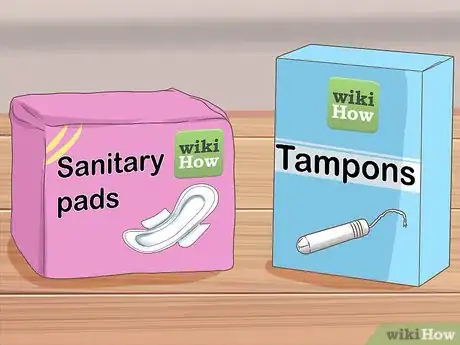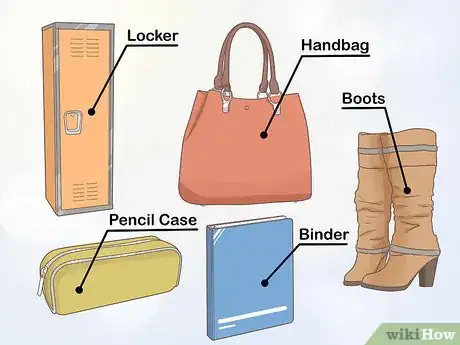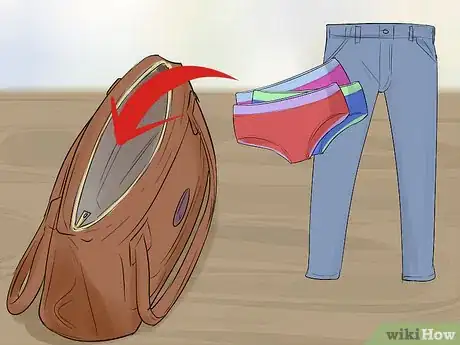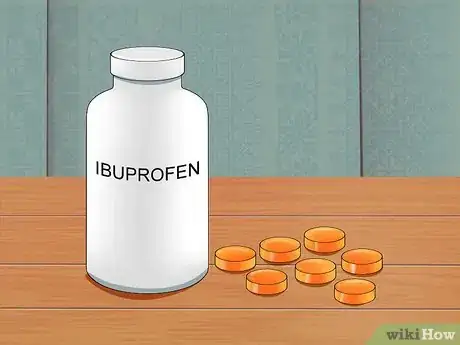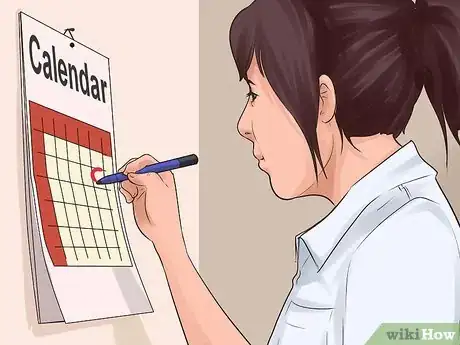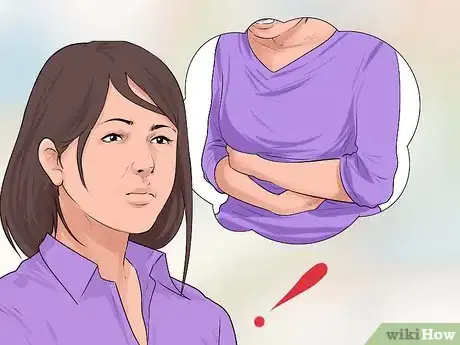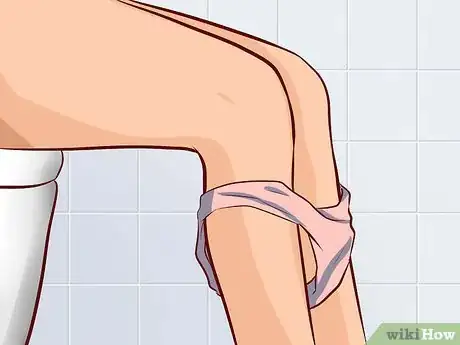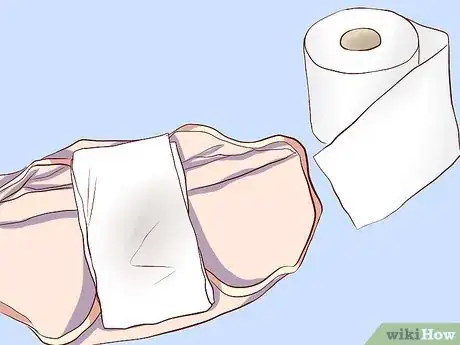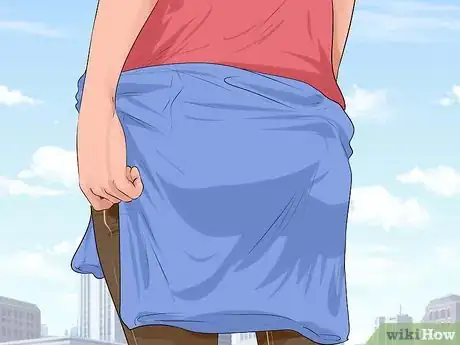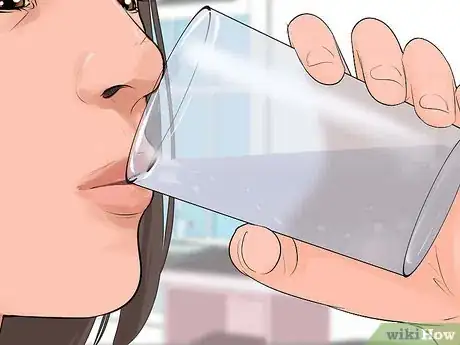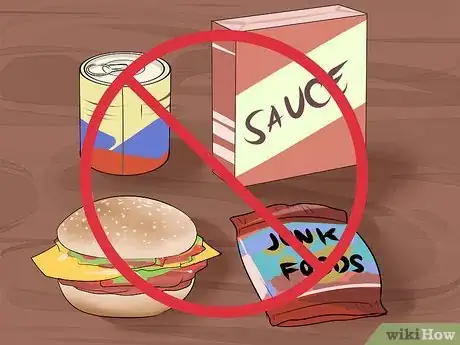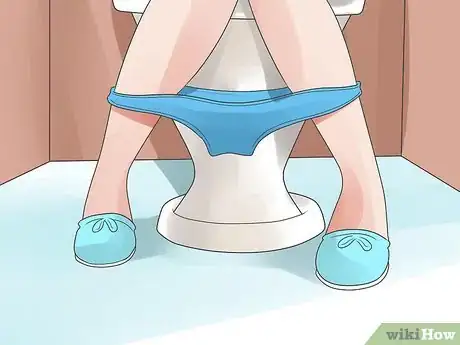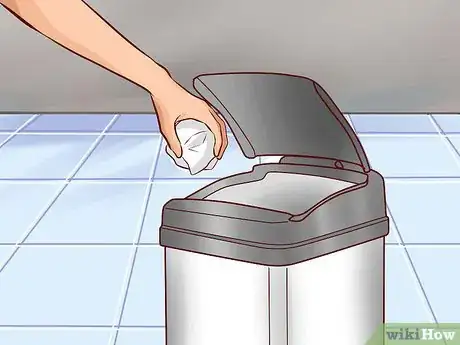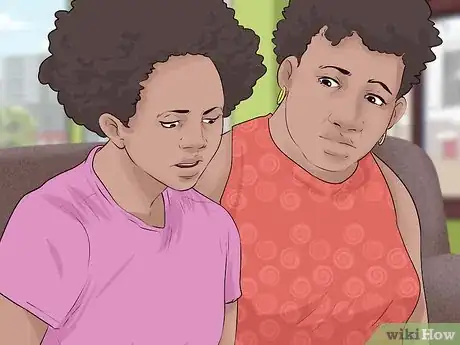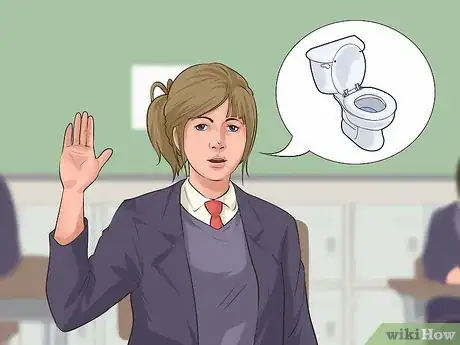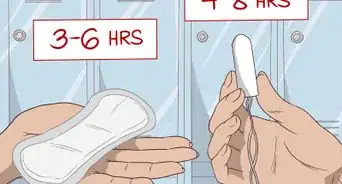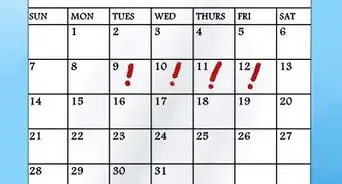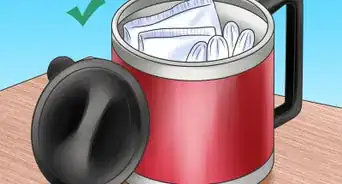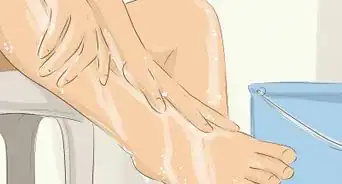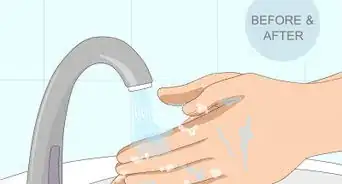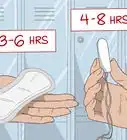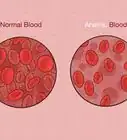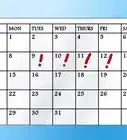This article was co-authored by Rebecca Levy-Gantt, MPT, DO. Dr. Rebecca Levy-Gantt is a board certified Obstetrician and Gynecologist running a private practice based in Napa, California. Dr. Levy-Gantt specializes in menopause, peri-menopause and hormonal management, including bio-Identical and compounded hormone treatments and alternative treatments. She is also a Nationally Certified Menopause Practitioner and is on the national listing of physicians who specialize in menopausal management. She received a Masters of Physical Therapy from Boston University and a Doctor of Osteopathic Medicine (DO) from the New York College of Osteopathic Medicine.
There are 11 references cited in this article, which can be found at the bottom of the page.
wikiHow marks an article as reader-approved once it receives enough positive feedback. This article received 58 testimonials and 91% of readers who voted found it helpful, earning it our reader-approved status.
This article has been viewed 1,058,473 times.
Dealing with your period at school isn't always fun, especially if you're getting cramps and finding it hard to make time to take a trip to the bathroom. However, if you make a solid game plan, you'll never have to worry about dealing with your period at school — or about being caught with an unexpected surprise — ever again. The most important thing is to have your supplies ready and to be comfortable with taking trips to the bathroom. Remember that you should be proud of getting your period and that it shouldn't be a source of embarrassment.
Steps
Being Prepared
-
1Have pads or tampons with you at all times.[1] If you really want to be prepared for your period at school, then the most important thing is to have pads, tampons, pantyliners, or whatever else you use on a regular basis with you throughout the school year, so you don’t have to worry about any unpleasant surprises. That way, you’re always prepared — and you can help out a friend who isn’t.
- You can also consider using menstrual cups, which are inserted into the vagina and collect blood at its base. They can last up to 10 hours, and you won’t be able to feel them. Though they aren’t as popular as tampons or pads yet, they are just as safe.
- If you have periods and you think that your period is going to come today (according to your period cycle), it is always better to put on a pad or pantiliner just before going to school, just to avoid worries. Even if you don't put a pad, pantiliner, or tampon on, always have extra underwear and pants handy.
-
2Understand that getting your period is nothing to be stressed about. When your period first comes, there should be a small amount, not a huge spurt of blood. Therefore, there is no reason to worry about your classmates discovering the fact that you have gotten your period. And there is no reason to worry about people hearing you open a pad or tampon in the bathroom either. Most people will likely ignore any rustling they hear, just like you probably do.Advertisement
-
3Launch a campaign for making your school "period friendly." Ask for pads and tampons to be made available in bathrooms, so that students who are on their periods don't need to take time off school because they don't have them on hand. Ask that all bathrooms have facilities for disposing of used pads and tampons. And most importantly, ask that students are allowed one break per class so that they can go if they suddenly get their period.
-
4Find good places to stash your sanitary supplies. Though there’s no shame in having anyone see your sanitary supplies, you can find places to stash them if you’re concerned about that. For one thing, you can put them in your purse, but if you can’t carry handbags in school, you can cleverly place them in your pencil case, tuck a pad into the pocket of your folder or binder, or even place a tampon down into your boots if you have no better options. If you think of some “hiding spots” in advance then you won’t be so nervous when that time of the month comes.[2]
- If you have a locker, use it. This will also be an easy place for you to keep your supplies all year long instead of having to bring them when your period comes.
-
5Pack an extra pair of underwear and pants just to feel safe. It's unlikely that you will leak through your underwear and pants, but being prepared with an extra pair of underwear and pants or leggings in the event of an emergency will help you avoid worry. Just knowing that they are there if you need them will keep you from worrying about having your period or having a leak.[3]
- You can also bring a sweater or sweatshirt to wrap around your waist, just in case.
-
6Pack a chocolate candy bar. If you have your period or are experiencing PMS, then you may want to add some extra chocolate to your diet. Studies show that chocolate alleviates some of the symptoms of PMS, and besides, chocolate is delicious for lots of people! Having a little chocolate can make you feel more stable emotionally, in addition to giving you a tasty treat.
-
7Have some medicine ready to alleviate menstrual pain. If you tend to suffer from menstrual pain such as cramps, bloating, nausea, or any of the other symptoms that may accompany your period, then you can carry around some medicine just in case. (Just make sure your school allows it.) You can use Tylenol, Advil, Midol, or another form of over-the-counter medication that works best for you. You don’t have to take it when you get your period, but having it on hand will help you feel better if you’re feeling less-than-great.[4]
- Make sure to talk to your parents/guardian and a doctor before you take any medication to make sure it’s right for you.
-
8Know when to expect your period. Your period may not be quite regular yet, but it can help to start tracking it so you know just about when to expect it. Not only will this keep you from being surprised in school, but it can also lead you to take precautions that can keep you from having an emergency, such as wearing a pantyliner the week you’re expecting to get your period, just in case you get it a bit early. If you haven't started your period yet prepare for the first time, in case it's at school.
- The average menstrual cycle is 28 days long, but can range from 21 to 45 days in teenagers and young adults. Mark the day your period starts on a personal calendar, or use a mobile app that helps you track your period, such as Clue, Period Tracker Lite, My Calendar, or Monthly Cycles.[5]
-
9Familiarize yourself with menstruation warning signs. Menstruation often causes side effects such as cramping, bloating, acne breakouts, and breast tenderness. If you’re experiencing one or more of these symptoms than usual, your period may be on its way.[6]
- When you notice symptoms like these, it’s a good time to double-check your supplies. Make sure your “emergency” pads or tampons are in their proper places, and restock your supply of pads/tampons and pain relievers at home.
- Wear dark clothing when you expect your period draws near. That way, if you do get any unexpected bleeding, the color will help mask it.
Reacting When Your Period Starts
-
1Go to the toilet as soon as possible. This allows you to assess the situation privately and find the supplies you need to make it through the rest of the day. As soon as you suspect your period has started, discreetly ask your teacher for permission to go to the toilet.
- Try approaching your teacher while the rest of the class is busy working. You can explain the situation directly if you feel comfortable doing so, but if not, you could also get the message across with something along the lines of, “I need to go to the toilet; my stomach hurts.”
-
2Ask a teacher, nurse, or friends for backup if you need it. If you’ve suddenly found yourself with your period and have no supplies, then don’t be embarrassed about going to your friends to ask if they have any pads or tampons you can use. If they can’t help you, try asking one of your teachers for help (just know that menopause happens around the age of 45-50, so you might not want to ask older teachers).[7]
- You can even go to the school office to ask for extra supplies, or ask them to call your parent/guardian if you really need help. Don’t be afraid to go there if you really have an emergency and can’t get help anywhere else.
- If you need more help, consider visiting the nurse. The nurse or school counselor can explain the ins and outs of menstruation if this is your first period, or help you obtain menstrual products and a change of clothing if needed.[8]
-
3Make an emergency pad if necessary. If you have no better options and find yourself in the bathroom when your period has just arrived, then your best bet may be to make an emergency pad. All you have to do is take a long piece of toilet paper and wrap it around your hand at least ten times until the pad is thick enough. Place it, lengthwise, in your underwear, and then take another long piece of paper and wrap it around the pad and your underwear another 8-10 times, until the pad is securely in place. You can repeat this one more time with another piece of toilet paper. Though this isn’t nearly as good as the real thing, it will do in a pinch.[9]
- If you have your period but it’s really light, you can also make an emergency pantyliner. Just get a length of toilet paper about as long as the panty line of your underwear, fold it over itself two or three times, and place it in your underwear.
-
4Wrap a jacket around your waist if needed. If you have one available, wrap a spare T-shirt, jacket, or sweatshirt around your waist, especially if you suspect menstrual blood has leaked through your clothing. This should help hide any dark stains until you can change clothing.
- If this is your first period, keep in mind that first periods generally aren’t super heavy, so it’s possible that you’ve noticed before the blood has leaked through your clothes. That being said, it’s still a good idea to take care of the issue as soon as possible to limit the risk of any leakage.
- If you discover that blood has leaked through your clothes, change into your PE kit (if available) or ask the school nurse or counselor to call your parents for a change of clothes. Don’t worry about classmates pointing out your sudden wardrobe change; if anyone questions it, you can casually tell them you spilled something on your pants and leave it at that.[10]
Having a Solid Game Plan
-
1Stay hydrated. Though it may sound counter-intuitive, staying hydrated will keep your body from retaining water, which will make you feel less bloated. You should carry around a water bottle or make sure to hit up the water fountains between classes as much as you can. Aim to get at least 10 8-ounce glasses of water throughout the day (80 oz). It can be tricky to drink a lot during school, but you can make sure to drink extra glasses before and after school.[11]
- You can also try to incorporate foods with lots of water in them into your diet to make sure you stay hydrated. These foods include watermelon, strawberries, celery, and lettuce.
- Minimize your caffeine intake. Take it easy with your consumption of caffeinated soda, tea, or coffee. This can make you dehydrated and can actually make cramping worse.
-
2Eat foods that prevent bloating. If you want to deal with your period in the best way possible, then you should avoid eating foods that cause bloating. The biggest culprits are fatty foods and carbonated foods. This means you should skip out on those French fries, ice cream, or hamburger and soda at lunch and focus on healthier wraps, salads, or turkey sandwiches. Replace your soda with a water or an unsweetened iced tea and you may feel better.[12]
- Fatty foods make you retain water, which makes you feel bloated.
- You should also avoid whole grains, beans, lentils, cabbage, or cauliflower.[13]
-
3Try not to skip out on gym class — it can relieve menstrual pain. Though you may feel like the last thing you want to do is go to gym class, it’s been proven that exercise actually makes you feel better when you’re on your period. It’s been shown that aerobic exercise makes your body pump more blood, which lets it release endorphins to counteract the prostaglandins in your body, reducing your cramps and pain. Don’t be tempted to sit in the bleachers with a frown on your face, and get out there instead.
- Of course, if you’re really feeling terrible, you may need to take a break from exercise on a given day, but you’ll be surprised by how much better you feel.
- If you skip gym because of your period, you’ll be singling yourself out and calling attention to yourself, instead of doing what everyone else is doing and taking your mind off of your pain.
-
4Plan to take bathroom breaks every 2-3 hours. Before you start your school day, you can make a plan to hit up the bathrooms every 2-3 hours so you can change your pads or tampons if your flow is heavy, or just make sure that everything is in working order. You may be nervous about leakage, and just having confirmation that everything is fine can make you feel better. Though you won’t need to change your tampon every 2 hours, you can aim to change it every 3-4 hours if you have a heavy flow; if your period is lighter, you may be able to go up to 5 or 6 hours but this is not recommended because it can lead to Toxic Shock Syndrome. Also, to avoid this make sure to only wear the lowest absorbency you need.
- Taking bathroom breaks every 2-3 hours will also help you relieve your bladder more often. Relieving your bladder when you have the urge to use the restroom can help relieve the cramps associated with your period.[14]
-
5Dispose of your pads or tampons correctly. When you’re in school, you should make sure to dispose of your pads and tampons in a sanitary way. Avoid flushing tampons, applicators, pads, liners and wrappers in the toilet, the only things that should ever be flushed down toilets are pee, poop and toilet paper. Try to use the bathroom stalls with little bins in them; if you have those, you should still wrap up your tampons and pads with their original wrappers, toilet paper or personal disposal bags, so they are totally wrapped up. Remember it is someone's job to have to empty those stall bins and they should not come in contact with bloody period products.
- If you’re not lucky enough to have a trash can in your stall, just wrap them up with toilet paper, original wrapper or personal disposal bag and throw them in the trash outside; don’t be shy about it, and remember that many students have to dispose of their sanitary napkins.
- Always make sure to wash your hands after you’ve changed your pad or tampon.
-
6Wear darker clothes if that makes you more comfortable. Though it’s unlikely that you’ll have a leak, you may want to wear darker clothes during the week of or before your period, just to keep yourself feeling secure. You can wear darker jeans or a darker dress just so you don’t have to worry about checking your backside or asking your friends to check for you every two seconds. Plan a few days of wearing darker colors if that makes you more comfortable.
- That said, don’t let your period keep you from wearing your favorite outfits. If you want to wear something light or pastel-colored, do what you want, knowing that there’s really nothing to worry about.
-
7Know how to respond when someone makes an insensitive remark. Remember to treat them how you would like to be treated, even if they were rude, and to not be mean or insensitive back. If they persist, contact a trusted adult. Try the following responses in the meantime:
- "I'm really not in the mood. Could you please stop that?"
- "I really need my space right now. Can you please stop that?"
-
8Ask to be excused when needed. If in class, a good option is to be excused to the school nurse or calmly explain your situation to the teacher and leave to your locker and the bathroom. Some good explanations without going too in-detail are below.
- "I'm having a moment, can I please use the washroom?"
- "Aunt Flo has given me a visit. I would like to be excused from class for a few minutes."
- "I have to go to the bathroom right away. May I please be excused?"
Maintaining a Healthy Mindset
-
1Don’t be embarrassed about it. Whether you’re one of the first students in your grade to be getting your period or one of the last, many of the people in your school will get their periods eventually. There’s no need to be embarrassed about something that affects many people in the world, and which is a natural part of growing up and having a more mature, changing body. Don’t let anyone tease you about it or let anyone make you feel anything other than proud about your period.
- Have a chat with your other friends about it. You’ll feel better knowing that you’re not alone in your feelings.
-
2Don’t worry about the smell. A lot of people worry about their periods “smelling” or people being able to tell that they’re on their period. However, your period itself will not smell; what you may smell is the odor-causing bacteria that can grow on a moist sanitary pad. To counteract this worry, you should change your pad every 2-3 hours or wear a tampon, but change it regularly too. Some people like to wear scented tampons or pads, but this smell can actually be more powerful than the smell of unscented sanitary napkins, so this can even irritate the vagina. But still, you can decide if this is right for you.
- You can try out a scented pad or tampon at home before you decide whether or not you’d like to use them in school.
-
3Make sure your parents/guardian know about it. Your period shouldn’t be a secret or something you’re embarrassed about. Though you may initially be shy about it, it’s important to tell your mother or father about it as soon as you’ve gotten it. If you are a cisgender girl, a mother or another woman in your family can help you get the proper supplies, make you feel comfortable, and help you avoid having to sneak around with your period. Remember that a lot of kids have to go through this and tell your parents/guardian when it happens; the sooner you tell them, the better you’ll feel.
- Your parents/guardian may be proud of you for telling them. They might even shed a few tears.
- You may be a little shy about telling a parent or guardian. But once you do, it’ll make things a lot easier, and they’ll be glad you were honest and open.
-
4Don’t be afraid to ask to use the restroom in class if you need to. If a teacher asks question, you can say that you urgently need to pee, or something else if you want (you don't want to be embarrassed in front of them). If you’re having an emergency or just know it’s time to change your sanitary napkin, then you shouldn’t be ashamed to ask to use the restroom. If you go into school with the mindset that it won’t be hard for you to use the restroom if you need to, then you’ll feel much more excited to go about your day. Ask your teachers if you can use the restroom in class with confidence, or even talk to your teachers about it in advance if that makes you more comfortable.[15]
- Be aware that your teachers and administrators should be more than prepared to help you with this problem. Keep reminding yourself that you’re not the first one to ever have to deal with their period in school!
Expert Q&A
-
QuestionIs it normal to leak during your period?
 Rebecca Levy-Gantt, MPT, DODr. Rebecca Levy-Gantt is a board certified Obstetrician and Gynecologist running a private practice based in Napa, California. Dr. Levy-Gantt specializes in menopause, peri-menopause and hormonal management, including bio-Identical and compounded hormone treatments and alternative treatments. She is also a Nationally Certified Menopause Practitioner and is on the national listing of physicians who specialize in menopausal management. She received a Masters of Physical Therapy from Boston University and a Doctor of Osteopathic Medicine (DO) from the New York College of Osteopathic Medicine.
Rebecca Levy-Gantt, MPT, DODr. Rebecca Levy-Gantt is a board certified Obstetrician and Gynecologist running a private practice based in Napa, California. Dr. Levy-Gantt specializes in menopause, peri-menopause and hormonal management, including bio-Identical and compounded hormone treatments and alternative treatments. She is also a Nationally Certified Menopause Practitioner and is on the national listing of physicians who specialize in menopausal management. She received a Masters of Physical Therapy from Boston University and a Doctor of Osteopathic Medicine (DO) from the New York College of Osteopathic Medicine.
Board Certified Obstetrician & Gynecologist If you're using a tampon or pad with the proper level of absorbency for your flow, you really shouldn't run into any leakage. If your flow has changed dramatically and your usual menstrual pad or tampon isn't working, it may be a good idea to see a doctor. If you always run into leakage, it's a sign you need a more absorbent pad or tampon, or that you aren't changing your pad or tampon often enough.
If you're using a tampon or pad with the proper level of absorbency for your flow, you really shouldn't run into any leakage. If your flow has changed dramatically and your usual menstrual pad or tampon isn't working, it may be a good idea to see a doctor. If you always run into leakage, it's a sign you need a more absorbent pad or tampon, or that you aren't changing your pad or tampon often enough.
Warnings
- Be clean. When you come out of the bathroom, make sure you left clean and tidy and not messy. Always remember to wash your hands.⧼thumbs_response⧽
- Change your pad every 4-6 hours, or your tampon every 4 - 8 hours. This may change depending on how heavy your period is.⧼thumbs_response⧽
- Before you bring Advil or Pamprin, etc. to school, make sure that it is allowed. Most schools have strict rules regarding drugs, which include over the counter medications, and bringing it could get you in trouble.⧼thumbs_response⧽
- Never use more than one tampon at a time. If you are worried about it leaking, you can use a pad or pantyliner along with the tampon.⧼thumbs_response⧽
- Never spray perfume on your pads and/or tampons before use and never spray perfume around your vagina. It could irritate your genitals.⧼thumbs_response⧽
- If you leave a tampon in too long, you could develop ‘’toxic shock syndrome, which is a rare but deadly disease. Make sure you change your tampon every 4 - 8 hours to be safe. Read the instructions on your tampon packaging to be fully aware of the risks.⧼thumbs_response⧽
Things You'll Need
- Pads or tampons
- Pain relievers (e.g. Tylenol, Advil, Midol)
- Spare change in case your school's restroom sells pads or tampons
- Spare change of pants and underwear
- Sweater
References
- ↑ https://www.ubykotex.com/get-the-facts/article?id=53992
- ↑ https://www.ubykotex.com/get-the-facts/article?id=53992
- ↑ https://kidshealth.org/en/teens/supplies.html?WT.ac=t-ra
- ↑ https://www.mayoclinic.org/diseases-conditions/premenstrual-syndrome/symptoms-causes/syc-20376780
- ↑ https://kidshealth.org/en/teens/menstruation.html
- ↑ https://www.mayoclinic.org/diseases-conditions/premenstrual-syndrome/symptoms-causes/syc-20376780
- ↑ https://kidshealth.org/en/kids/period-school.html
- ↑ http://kidshealth.org/en/kids/period-school.html?WT.ac=ctg#
- ↑ https://www.ubykotex.com/get-the-facts/article?id=50742
- ↑ https://kidshealth.org/en/kids/period-school.html
- ↑ http://www.webmd.com/women/tc/menstrual-cramps-home-treatment
- ↑ http://www.healthline.com/health-slideshow/menstrual-cramp-remedies#8
- ↑ http://www.webmd.com/digestive-disorders/diarrhea-10/bloated-bloating
- ↑ http://www.webmd.com/women/tc/menstrual-cramps-home-treatment
- ↑ http://kidshealth.org/kid/grow/girlstuff/period_school.html#
About This Article
Dealing with your period at school can be a bit tricky, but you can make things easier by always keeping pads or tampons with you. Keep an extra pair of underwear in your bag too, in case you need to change. You can also wear dark clothes during your time of the month if you’re worried about any leaking. If you find yourself without any supplies, ask a friend or young female teacher, since many females will carry tampons or pads. To go to the bathroom during class, just ask your teacher. If they’re hesitant to let you, quietly mention that it’s for girl problems. For more tips, including how to make an emergency pad if you can’t find any at school, read on!
